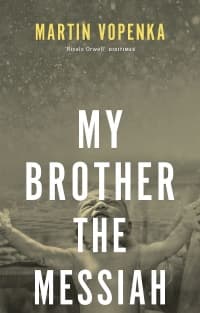
My Brother the Messiah by Martin Vopenka
(Barbican Press, 2021)
Reviewed by Matt Colborn
This subtle, satirical book by Czech author Martin Vopenka examines the consequences of a new Messiah, named Eli, in the twilight era of a failing near-future global civilisation. The story is told through the eyes of Eli’s brother, Marek.
The narrative moves between ‘New Vinohrady,’ a New Slav colony in Northern Greece in 2168 and early 22nd century Prague-Holesovice. In 2168, Marek the old man contemplates the life of his brother Eli, who was assassinated in Dubrovnik almost forty years previously. He lives with a sect of followers of the dead Messiah.
Marek and Eli were the sons of a bodyguard of Lifelong, the dictator. When they were children, the nations of the world put a diffraction grille in orbit to ‘diffuse some of the solar radiation’ falling on Earth. The aim was to gradually cool the atmosphere. Instead, it fosters a new ice age.
In the late 22nd century portion of the novel, a young woman moves in with Marek, causing dissent in the sect. Marek is pressured to reject her, but hungry for companionship, resists. The community sees Marek as the keeper of Eli’s words and theoretically above such basic human needs.
In the outside world, the birthrate has dropped catastrophically, as people struggle to conceive. No-one knows why. The followers of Eli seem exempt from this curse. Medical scientists are keen to perform medical tests on the followers, but Marek rejects this, recalling Eli’s claim that ‘the reign of humans is over.’
The style and tone of this novel contrasts significantly with some dominant voices in English-language SF. It’s instructive comparing Vopenka’s style with recent US utopian novels like Kim Stanley Robinson’s Ministry of the Future (2020) and Cory Doctorow’s Walkaway (2017). The moral universe of the US novels seems broadly far less ambiguous than the one presented in My Brother the Messiah.
Both Robinson and Doctorow take the benefits of technology and scien fic materialism for granted. In Ministry, Robinson advocates geoengineering, whilst in Vopenka’s novel this sort of global, cooperative technocratic adventure has led to disaster. Technological utopianism, a key theme of Robinson’s and especially Doctorow’s works, is savaged by Vopenka and perhaps with good reason. In Eastern Europe technocratic, utopian impulses have historically had disastrous outcomes. Instead Vopenka foregrounds technological hubris.
Religion, too, is handled differently in My Brother the Messiah. Although Vopenka’s work is satirical, his approach to religion remains subtle and nuanced. This differs from the mechanistic, reductionist take in Robinson’s novel, where one character claims that ‘huge parts of the brain’ are devoted to religious emo on and that religious sensations are ‘explicable’ as activations of the temporal lobe.
By contrast, Vopenka is alive to the multi -layered complexity of religious movements, as well as the emotional interplay between belief and doubt that forms a key part of religious experience. Vopenka’s novel also concerns the sociological pull that religious or spiritual groups hold in nominally secular, technocratic societies. This is as often due to the failures and shortcomings of secular rationalism as it is to a need for transcendent belief. In Vopenka’s future, people understandably feel that science and technology has failed them. This sentiment is expressed several times in the novel. Eli states that ‘what we’ve created is evil,’ stating that ‘…science is to blame’ for the current situation. Eli also says that ‘…science will not save us. It’s too late for that.’
But in the end, religion proves as unreliable as technology. ‘Miracles’ remain elusive, or at least questionable. In Dejvice, Eli curses cars, which stop working. In New Vinohrady, a young woman has a vision of Eli, recalling Marian visions at Lourdes or Fatima. But according to Eli human immortality is not, it seems, an option. A wryly humorous, disturbing novel that refuses the pitfalls of either lazy rationalism or unthinking faith.
Review from BSFA Review 14 - Download your copy here.
